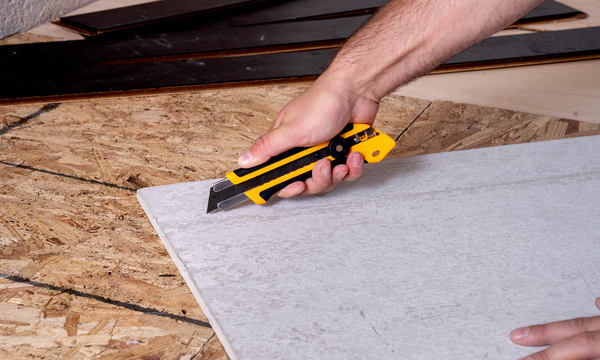
Start the New Year with These Tool Maintenance Tips
Regardless of whether you are an experienced professional or you’re a do-it-yourself (DIY) hobbyist, taking care of your tools is essential to get the job done. From utility knives, to blades, scrapers and specialty cutting tools, there are very simple yet effective maintenance practices that you can apply on a daily basis – that will make your job easy and fast in the long run. To help you start the new year right, our OLFA experts are sharing those maintenance tips that you should always keep in mind after you purchase your favorite tool.
1. Cleaning Is Key
Cleaning your tools is probably the last thing you want to do after a hard day’s work, but no matter the tool you’re using, you should always clean it at the end of every shift and before storing them away for the night. This will make sure the tool doesn’t get rusted or coated with residues that could be difficult to remove afterwards. Most hand tools can be cleaned using a microfiber cloth and warm water, although some are easier to clean than others purely based on the material they’re made of. Stainless steel or fiberglass are some of the quickest, as they can be cleaned with a simple wipe down. If your utility knife has specific lock mechanisms, you should periodically clean them with a light oil. After cleaning the body of your tool, clean the handles and then blades.
(Tip!): When cleaning your blades, make sure you carefully clean them by hand. Don’t put them in the dishwasher as the extreme hot temperature and air can damage them.
2. Inspection Can Make it or “Break It”
A lack of regular inspection of your hand tools can be a deal breaker. Even if you’re not planning to work with your tools for a while, you should regularly check them: inspect your handles for breaks, cracks and check your metal parts for signs of corrosion or rust. It’s recommended to wear protective gloves during this process. Smaller cracks on your plastic handles can usually be fixed with glue, or plastic slurry, but if the crack is too big, it may be time to replace your tool. For your metal tools, make sure that you oil them regularly, and if you’re someone who works in a damp, humid environment, think about investing in a corrosion resistant tool (like the OLFA SVR 2 Stainless Steel Auto-Lock Utility Knife).

3. Sharp, Sharp, Sharp
Your tools should stay sharp at all times. Sharp tools are most effective and require less effort to cut, which in turn helps prevent risks of potential injuries to yourself and damages to the project you’re working on. This is true especially for utility knives. If you want to cut down time in sharpening your tool, you should consider a snap-off utility knife. The OLFA LA-X Utility Knife is considered the must-have knife by professionals of all trades. Among its many features, this tool is loved because no additional tools are required to change the snap blade. Simply snap for a new edge and you’ll have an instant sharp blade the second the dull segment is snapped. If you’re interested to learn how to properly snap your blade of your utility knife, check out our video featuring experienced carpenter Chris Milton.

4. Use Them Properly
All tools can have a different use that you hadn’t uncover yet – who knew some of our experts use the OLFA L-1 Utility Knife to sharpen their pencils? But even though tools can be used in unusual ways, you should always make sure you’re following the manual. Don’t use your favorite knife as a hammer. Avoid using it in place of a scraper, screwdriver, chisel, or kitchen knife. When you’re scraping, only scrape by moving the scraper forward, like a plow. Hold your tool pointing down with your guiding hand. If your knife features a retractable blade (like the OLFA SK-4 Safety Knife), make sure you retract the blade into its housing once the job is complete.

Although it may seem like a hassle, regular maintenance on your tools will prolong the life and performance on the job site, improve safety and even reduce costs tied to neglected equipment. So, make sure you follow these maintenance tips and take care of your tools: they will love you back!
Contributor: Cassie Donnelly, Sr. Brand Manager at OLFA North America


